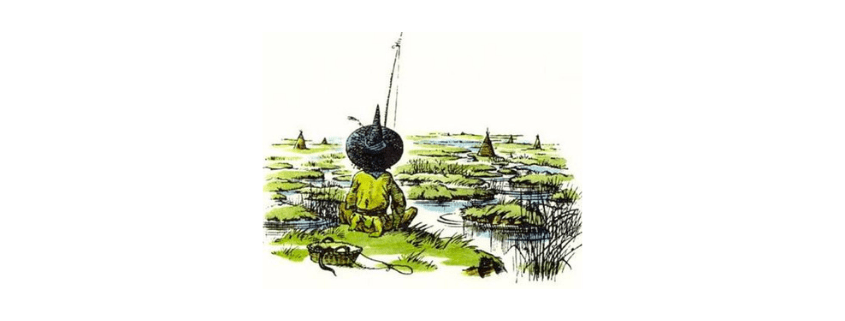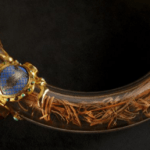Who is your favourite character from Narnia? For those under 30, the Narnia chronicles are children’s books penned by CS Lewis, a kind of forerunner to Game of Thrones with much less blood and sex.
My favourite is Puddleglum the Marsh Wiggle from the Silver Chair. Puddleglum is the Eeyore of Narnia. His outlook is uniformly bleak. In his world, it’s best to keep your expectations low and it is almost certain to rain tomorrow. But Puddleglum has the best line in the story.
Jill and Eustace are trapped in the Underworld trying to rescue the Prince. All three fall under the Witch’s spell. All is about to be lost. Then Puddleglum bravely sticks his foot in the fire. He draws a line. The smell of burnt Marshwiggle starts to lift the enchantment. The pain clears his head. “One word, Ma’am”, he says to the Witch…
“Suppose we have only dreamed and made up all those things – trees and grass and sun and moon and stars and Aslan himself…. Then all I can say is that the made-up things seem a good deal more important than the real ones. Suppose this black pit of a kingdom of yours is the only world. Well, it strikes me as a pretty poor one. We’re just babies making up a game if you are right. But four babies playing a game can make a play-world which licks your real-world hollow”.
Puddleglum holds the vision of the light, of the kingdom of Aslan, even in the darkest places of despair. In that tension he finds the courage to stand, to act, and to bring hope to others. We come together this Maundy Thursday to renew our commitment to ministry and to place our feet back in the fire for another year.
How are we to minister and serve in such a very lost and broken world? In a society which is so unsure of itself? In which people carry heavy burdens and face fear and despair with such meagre inner resources? How are we to help our communities back to a place of confidence and fairness?
How are we to continue to help the world find the strength to fight the chaos of climate change and unite around the goals of justice and peace? The imperfections of the Church sap our strength. All of us have heavy burdens to bear ourselves. How can we shoulder them and yet still offer hope and healing to the world?
Puddleglum is a character from a story. But Puddleglum stands in the long line of the prophets: men and women who are utterly realistic about the condition of the world and of the human heart and of the people of God and yet are filled with a vision and hope beyond themselves.
When Jesus stands in the synagogue at Nazareth and unrolls the Book of Isaiah and reads these words, he is standing in that tradition: holding the darkness of the world in tension with the deeper vision of God’s kingdom. We must stand there too: “The Spirit of the Lord is upon me, because he has anointed me to bring good news to the poor. He has sent me to proclaim release to the captives and recovery of sight to the blind. To let the oppressed go free”.
We must stand there too, however difficult we find it. There is another kingdom. We must stand in the place of hope. We must hold out in our lives and our preaching the tender message of salvation for lost and broken people. We must craft and proclaim from the scriptures a vision for humankind and creation which is more loving and honest and hopeful than anything this world offers. We are called to sustain by word and sacrament thousands of imperfect and countercultural communities who hold out a different vision of human life and which infect and re-infect the world’s dis-ease with God’s deep medicine of joy.
This is no easy ministry. The longer I am a bishop, the more clearly I see what this vocation to serve God’s church can cost; the more deeply I appreciate the sacrifice and dedication of colleagues and friends who are LLMs, deacons, priests and bishops and who serve in different ways. Thank you on behalf of God’s church for your faithfulness to God’s call. Thank you to all who support and encourage those called to these ministries.
This is no easy ministry. But these ministries remain vital ministry not only for the Church but for the world. There is no greater need than the rekindling of hope, the singing of a different song. All of us need to watch over ourselves, to acknowledge the difficulty of our calling, to take time out for refreshment and renewal, to recover where we are wounded, to live gently where we can because we too are loved by God and precious in God’s sight.
And as we renew our commitment to this ministry, how will we minister in this coming year? May I offer you three pathways to reflect on and to explore which flow from this service and especially from the blessing of the oils.
The first is to recover confidence in the Church’s ministry of healing, symbolised by the oil for anointing the sick and dying.
To pray for healing is to be utterly honest about the human condition but also to hold out a vision of love and hope.
For some years now, the ministry of healing has been, I think, declining in importance in our churches. But we live in times of great pain and confusion. I have begun to notice some churches offering opportunities for prayer and anointing again: moments of grace where we lift those who are suffering to God. Take these oils and use them to anoint the sick and the dying and see what God will do.
The second is to recover confidence in the great sacrament of baptism with confirmation, symbolised by the oil for signing with the cross at baptism. To baptise and mark others with the sign of the cross is to be utterly honest about the human condition to but also to hold out a vision of love and transformation.
We are still at the beginning of the renewal of catechesis in our diocese. We want to see children and young people and adults come to a living faith in Christ, baptised into the life of the Church and equipped as mature disciples to serve God in the whole of their lives. I see encouraging signs of new beginnings, first steps in confidence but we have much still to learn. Take these oils and use them to sign many with the cross at the beginning of their journey of faith as children and as adults.
The third is to recover confidence in our ministry of calling others to Christian service in a thousand different ways, symbolised by the oil of chrism. To call others into ministry and mission is to be utterly honest about the state of the world but to hold out a vision of God’s purpose and of a new creation. There is much good work going on to encourage vocations across our Diocese and I am thankful for all those who are involved. One sign of growing confidence and life will be that the flame of this vocations work will spread to more and more parishes as we recover hope and confidence in God’s grace and see more and more diverse groups of people offering themselves in God’s service.
Take these oils and use them as a reminder that you too are called to invite others into the cost and joy of these ministries.
Four babies playing a game can make a play-world which licks your real world hollow. On this day we will remember all that Christ gives to us in the Eucharist. We will remember Christ’s call to service and to the washing of feet. We will remember the new commandment to love one another.
You and I are called to be a people of hope; contemplative, compassionate, courageous. May God renew in each of us that hope and strength in ministry for the sake of God’s Church and for the sake of God’s world.
+Steven
—
The sermon from the Blessing of the Oils service at Dorchester Abbey on Maundy Thursday, 18 April 2019.
See a behind the scenes photo gallery of the service on the Diocese of Oxford Facebook page.



